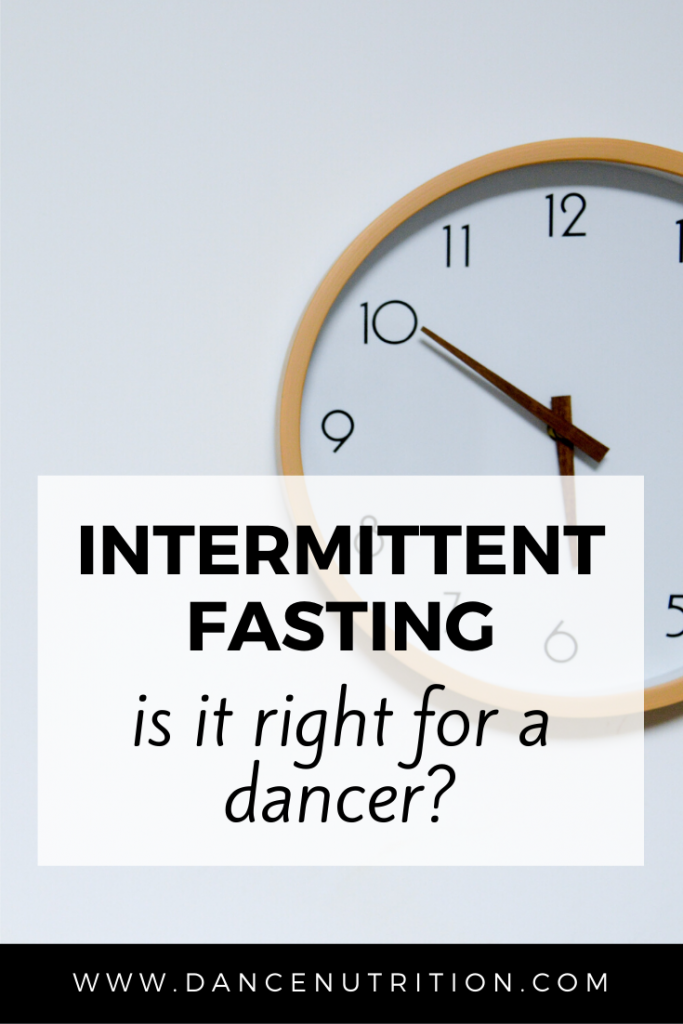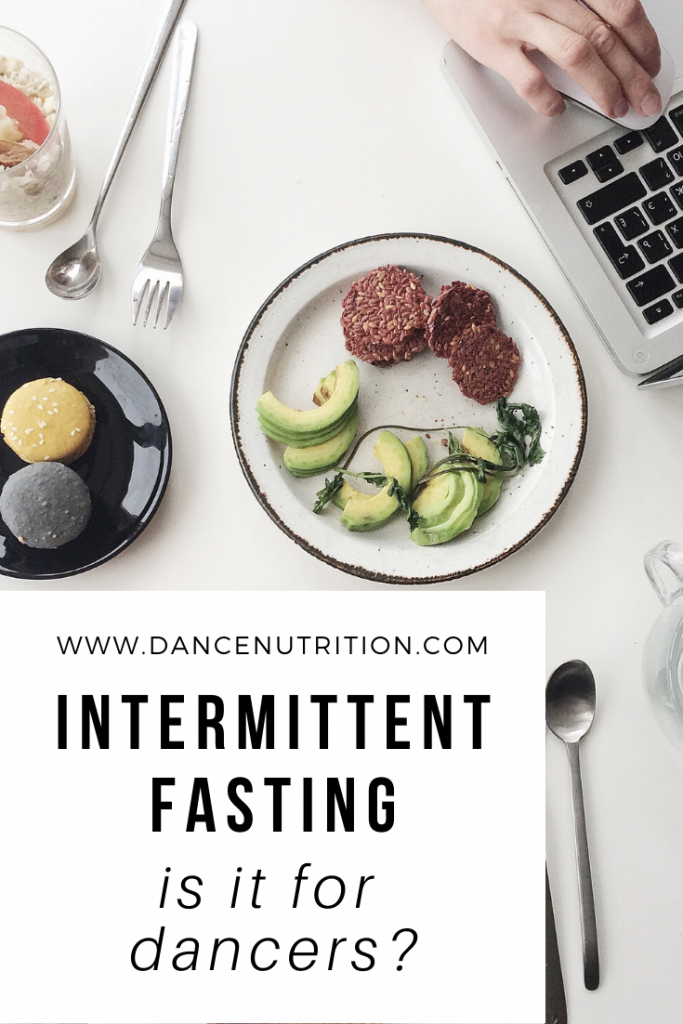A dancer recently asked about the potential benefits of intermittent fasting after reading claims that it can improve cognitive function and energy. To this dancer, intermittent fasting didn’t seem like a restrictive diet, since all foods would technically be allowed within a specific time window. But is it really that simple?
If you’ve ever considered intermittent fasting, it’s important to understand the facts before committing. In this article, we’ll explore whether intermittent fasting is a good choice for dancers and how it may impact your performance. As a note, this piece won’t address fasting for religious or cultural reasons. Religious fasting can be especially challenging for dancers in recovery from eating disorders or disordered eating. Here’s a great article that discusses more on the topic. If you’re navigating this, it’s essential to seek support from a licensed dietitian with expertise in eating disorders.
What Is Intermittent Fasting?
Intermittent fasting (IF) is an eating pattern that alternates between periods of eating and fasting. While the specific protocols vary, the most popular method is the “16:8” protocol, which involves fasting for 16 hours and eating only during an 8-hour window each day. More extreme methods, such as the 5:2 plan, involve eating normally for five days and restricting the other 2 days to only 25% of one’s total daily calorie needs.
Despite its popularity, it’s essential to recognize that intermittent fasting is, at its core, a restrictive eating plan, often disguised as a health intervention. While its benefits are often touted in the media, the research supporting those claims is limited and inconclusive. Let’s take a closer look.
What Does The Research Say?
Proponents of intermittent fasting suggest a range of reasons, from weight loss and disease prevention to improved cognitive function. However, research does not consistently support these claims, especially when it comes to dancers and athletes. Most studies on intermittent fasting are limited to small sample sizes, lack of long-term follow-up, and reliance on self-reported data— often unreliable at best.
A review of current research indicates that intermittent fasting shows no significant benefits over other restrictive diets. In fact, when compared to other dietary patterns, IF did not demonstrate substantial differences in weight loss, body composition, blood pressure, or other health markers. Critically, there is no evidence to suggest that intermittent fasting benefits dancers or athletes in particular.
But What if I Eat Enough During the Eating Window?
One of the most common justifications for intermittent fasting is that if you eat enough during the “allowed” hours, you can meet your nutritional needs. While this may be true in theory, intermittent fasting still presents challenges— especially for dancers who require optimal fuel for high-performance activity. Here are a few reasons why intermittent fasting may not support a dancer’s needs:
4 Reasons To Skip Intermittent Fasting
#1: It doesn’t support a dancer’s unique energy needs
Dancers require quick, readily available energy for sustained movement— especially for high-intensity activities like jumps or turns. The body primarily relies on glycogen, stored in muscles and the liver, as its go-to energy source for these activities. While fat is also an energy option, glycogen is preferred and easily accessed during demanding movement. This allows the body to conserve protein and fat for processes like hormone production, muscle building, vitamin absorption, and even bone development.
#2: It doesn’t support a dancer’s mindset
Intermittent fasting isn’t just physically restrictive— it can also be mentally taxing. Fasting introduces rigid rules around when you can eat, potentially leading to anxiety, obsessive thoughts about food, and preoccupation with your eating windows. This mental burden can take a toll on your overall well-being and distract you from the joy of dancing.
When eating becomes restricted, it can also trigger cravings and food-related stress, further undermining both your mental focus and your physical performance. As dancers, we already face immense pressure, and introducing food rules can worsen this stress, negatively affecting your mental health and training outcomes.
#3: It’s not necessarily a “break” for your digestive system
One common reason for intermittent fasting is that it allows your digestive system to “rest” from food processing. But the reality is, your body already takes natural breaks during sleep, when digestion is less active, and the body focuses on recovery and repair. Trying to mimic this with a fasting protocol often leads to unnecessary stress on your system.
If you’re looking for a “break” from food, remember that your body naturally gets this rest during sleep— arguably considered (in fancy terms) a nocturnal circadian rhythm fast. Just a note: for early-morning workouts or late-night performances, a well-fueled body is essential for peak performance, making fasting around these times counterproductive. If you find yourself wanting to use intermittent fasting as a means to halt late-night grazing, then read this article to better tackle the behavior.
#4: What if I eat intuitively when I’m not fasting?
Intuitive eating and intermittent fasting are polar opposites. Intuitive eating promotes a healthy relationship with food by reconnecting to your body’s intrinsic appetite cues. In contrast, intermittent fasting relies on externally imposed rules to dictate when and what you can eat. Rather than fostering self-trust and body awareness, intermittent fasting introduces a rigid structure that could contribute to disordered eating patterns. Given that dancers are three times more likely to develop an eating disorder than the general population, it’s crucial to recognize that intermittent fasting is not a supportive solution.
Key Takeaway: Is Intermittent Fasting Right for Dancers?
For dancers, intermittent fasting can present more challenges than benefits. It fails to provide the necessary energy support required for peak performance, and the psychological and emotional toll of restrictive eating can be harmful. Given the high risk of eating disorders in the dance world, it’s essential for dancers to focus on nourishing their bodies with balanced, consistent fuel throughout the day— rather than imposing restrictive rules. Before experimenting with intermittent fasting, or any diet for that matter, it’s important to speak with a registered dietitian who understands your unique needs as a dancer.




